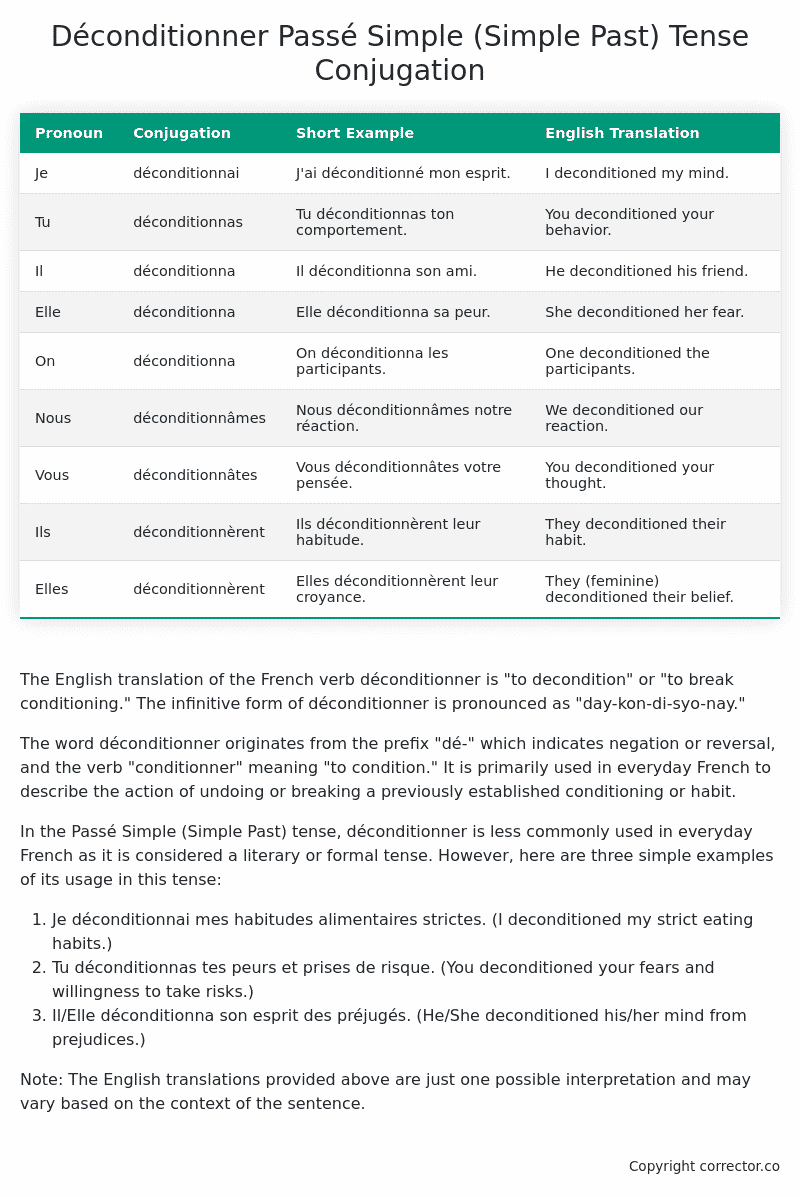Passé Simple (Simple Past) Tense Conjugation of the French Verb déconditionner
Introduction to the verb déconditionner
The English translation of the French verb déconditionner is “to decondition” or “to break conditioning.” The infinitive form of déconditionner is pronounced as “day-kon-di-syo-nay.”
The word déconditionner originates from the prefix “dé-” which indicates negation or reversal, and the verb “conditionner” meaning “to condition.” It is primarily used in everyday French to describe the action of undoing or breaking a previously established conditioning or habit.
In the Passé Simple (Simple Past) tense, déconditionner is less commonly used in everyday French as it is considered a literary or formal tense. However, here are three simple examples of its usage in this tense:
- Je déconditionnai mes habitudes alimentaires strictes. (I deconditioned my strict eating habits.)
- Tu déconditionnas tes peurs et prises de risque. (You deconditioned your fears and willingness to take risks.)
- Il/Elle déconditionna son esprit des préjugés. (He/She deconditioned his/her mind from prejudices.)
Note: The English translations provided above are just one possible interpretation and may vary based on the context of the sentence.
Table of the Passé Simple (Simple Past) Tense Conjugation of déconditionner
| Pronoun | Conjugation | Short Example | English Translation |
|---|---|---|---|
| Je | déconditionnai | J’ai déconditionné mon esprit. | I deconditioned my mind. |
| Tu | déconditionnas | Tu déconditionnas ton comportement. | You deconditioned your behavior. |
| Il | déconditionna | Il déconditionna son ami. | He deconditioned his friend. |
| Elle | déconditionna | Elle déconditionna sa peur. | She deconditioned her fear. |
| On | déconditionna | On déconditionna les participants. | One deconditioned the participants. |
| Nous | déconditionnâmes | Nous déconditionnâmes notre réaction. | We deconditioned our reaction. |
| Vous | déconditionnâtes | Vous déconditionnâtes votre pensée. | You deconditioned your thought. |
| Ils | déconditionnèrent | Ils déconditionnèrent leur habitude. | They deconditioned their habit. |
| Elles | déconditionnèrent | Elles déconditionnèrent leur croyance. | They (feminine) deconditioned their belief. |
Other Conjugations for Déconditionner.
Le Present (Present Tense) Conjugation of the French Verb déconditionner
Imparfait (Imperfect) Tense Conjugation of the French Verb déconditionner
Passé Simple (Simple Past) Tense Conjugation of the French Verb déconditionner (You’re reading it right now!)
Passé Composé (Present Perfect) Tense Conjugation of the French Verb déconditionner
Futur Simple (Simple Future) Tense Conjugation of the French Verb déconditionner
Futur Proche (Near Future) Tense Conjugation of the French Verb déconditionner
Plus-que-parfait (Pluperfect) Tense Conjugation of the French Verb déconditionner
Passé Antérieur (Past Anterior) Tense Conjugation of the French Verb déconditionner
Futur Antérieur (Future Anterior) Tense Conjugation of the French Verb déconditionner
Subjonctif Présent (Subjunctive Present) Tense Conjugation of the French Verb déconditionner
Subjonctif Passé (Subjunctive Past) Tense Conjugation of the French Verb déconditionner
Subjonctif Imparfait (Subjunctive Imperfect) Tense Conjugation of the French Verb déconditionner
Conditionnel Présent (Conditional Present) Tense Conjugation of the French Verb déconditionner
Conditionnel Passé (Conditional Past) Tense Conjugation of the French Verb déconditionner
Conditionnel Passé II (Conditional Past II) Tense Conjugation of the French Verb déconditionner
L’impératif Présent (Imperative Present) Tense Conjugation of the French Verb déconditionner
L’impératif Passé (Imperative Past) Tense Conjugation of the French Verb déconditionner
L’infinitif Présent (Infinitive Present) Tense Conjugation of the French Verb déconditionner
L’infinitif Passé (Infinitive Past) Tense Conjugation of the French Verb déconditionner
Le Participe Présent (Present Participle) Tense Conjugation of the French Verb déconditionner
Le Participe Passé (Past Participle) Tense Conjugation of the French Verb déconditionner
Struggling with French verbs or the language in general? Why not use our free French Grammar Checker – no registration required!
Get a FREE Download Study Sheet of this Conjugation 🔥
Simply right click the image below, click “save image” and get your free reference for the déconditionner Passé Simple tense conjugation!

Déconditionner – About the French Passé Simple (Simple Past) Tense
Formation
Usage
Narration
Historical Context
Interactions with other tenses
Passé Composé
Imparfait
Conditional and Subjunctive
Summary
I hope you enjoyed this article on the verb déconditionner. Still in a learning mood? Check out another TOTALLY random French verb conjugation!


